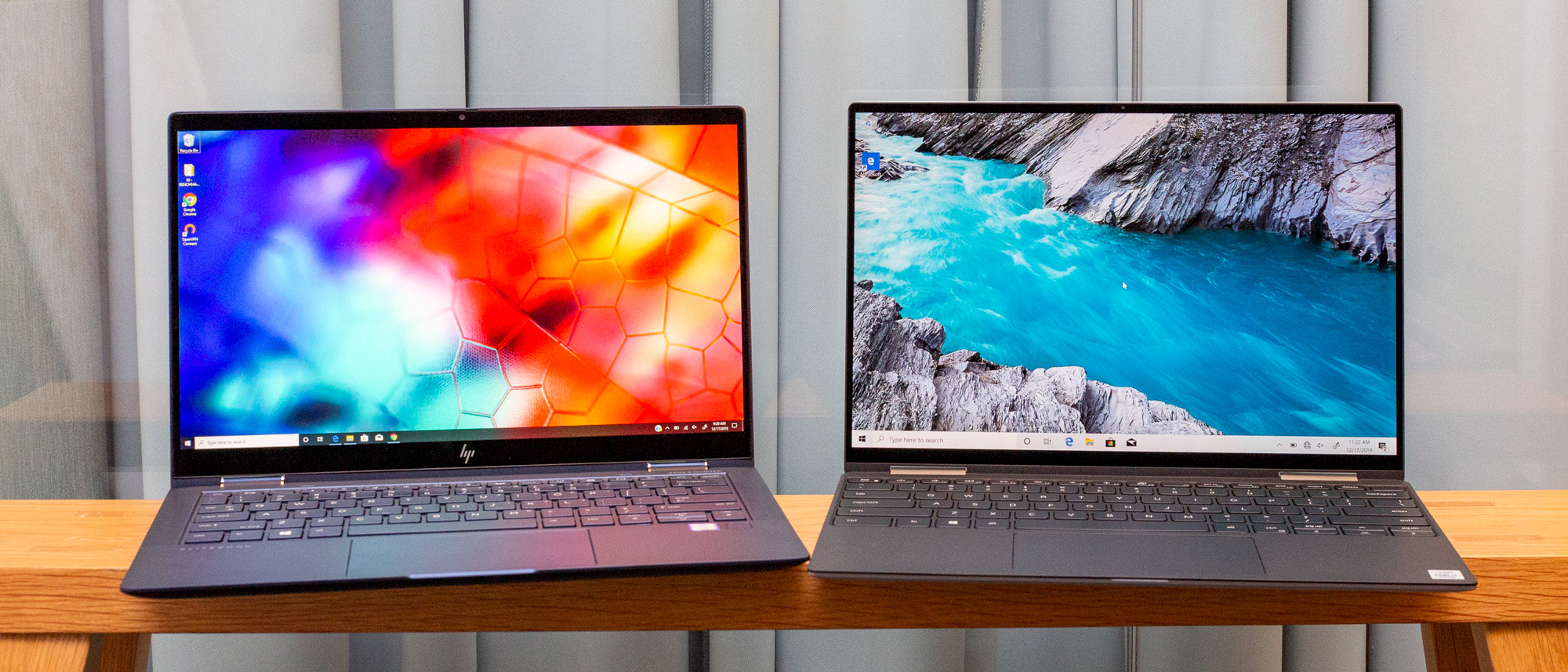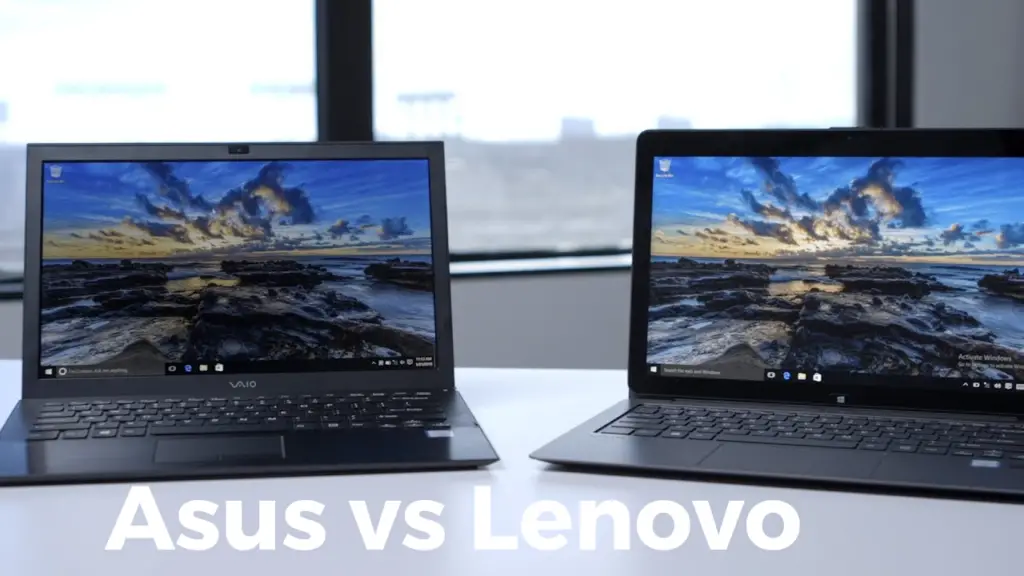Introduction
- Brief overview of the popularity of Asus and Lenovo laptops
- Importance of choosing the right brand based on individual needs
- Outline of the key factors to consider when comparing Asus and Lenovo laptops
Asus and Lenovo are two popular brands in the world of laptops, known for their quality and innovation. Both companies have a wide range of laptops that cater to different types of users and purposes, from business laptops to gaming laptops to ultrabooks.
When it comes to choosing a laptop, it’s important to select a brand that meets your individual needs. Factors such as performance, battery life, design, and price should all be taken into consideration. Additionally, different brands may have varying levels of customer support, warranty options, and software features.
Asus is a Taiwanese multinational computer hardware and electronics company that was founded in 1989. The company is known for producing high-quality gaming laptops, ultrabooks, and 2-in-1 laptops. Asus laptops are often praised for their sleek designs, powerful performance, and reasonable price points.
Lenovo, on the other hand, is a Chinese multinational technology company that was founded in 1984. The company is well-known for producing reliable and durable business laptops, such as the ThinkPad series. Lenovo laptops are also popular among students and professionals due to their long battery life and ergonomic keyboard designs.
When comparing Asus and Lenovo laptops, it’s important to consider key factors such as processor speed, display quality, storage capacity, and graphics performance. Other important factors to consider include build quality, battery life, and customer support. Ultimately, the best laptop for you will depend on your specific needs and preferences, as well as your budget.

Performance
- Processor
- Comparison of Intel and AMD processors in Asus vs Lenovo laptops
- Pros and cons of each processor
- Explanation of how the processor affects the laptop’s performance
- Graphics
- Comparison of dedicated and integrated graphics in Asus and Lenovo laptops
- Pros and cons of each graphics option
- Explanation of how the graphics affect the laptop’s performance
- Storage
- Comparison of the types of storage (HDD vs SSD) in Asus and Lenovo laptops
- Pros and cons of each storage type
- Explanation of how the storage affects the laptop’s performance
Processor:
Asus vs Lenovo laptops use both Intel and AMD processors, which are the two main players in the processor market. Intel is known for its reliable performance and power efficiency, while AMD is praised for its strong graphics capabilities and budget-friendly options.
Intel processors are commonly found in both Asus and Lenovo laptops. They offer strong single-threaded performance, making them ideal for tasks such as web browsing and video conferencing. Additionally, Intel processors often have better power efficiency compared to AMD, which can lead to longer battery life.
AMD processors, on the other hand, are known for their excellent multi-threaded performance, which makes them ideal for tasks such as video editing and gaming. They are also generally more budget-friendly than Intel processors, making them a great option for those looking to save some money.
In terms of performance, the processor plays a crucial role in determining the speed and responsiveness of the laptop. The processor is responsible for executing instructions and managing system resources, so having a powerful processor can significantly improve the overall performance of the laptop.
Graphics:
Asus vs Lenovo Laptops also offer both dedicated and integrated graphics options. Integrated graphics are built into the processor and are suitable for basic tasks such as web browsing and video playback. Dedicated graphics, on the other hand, are separate from the processor and are designed for more demanding tasks such as gaming and video editing.
Integrated graphics are often found in budget-friendly laptops and are more power-efficient than dedicated graphics. However, they have limited capabilities and are not suitable for demanding tasks that require high-quality graphics.
Dedicated graphics, on the other hand, offer much better performance and are ideal for tasks that require high-quality graphics, such as gaming and video editing. However, they consume more power and can lead to shorter battery life.
In terms of performance, the graphics card is responsible for rendering images and videos. Having a powerful graphics card can significantly improve the visual quality of the laptop, making it ideal for tasks that require high-quality graphics.
Storage:
Asus and Lenovo laptops offer both HDD (hard disk drive) and SSD (solid-state drive) storage options. HDDs are the traditional storage option and offer larger storage capacity at a lower cost, while SSDs are newer and more expensive, but offer faster read and write speeds and better reliability.
HDDs are often found in budget-friendly laptops and are ideal for those who need to store large amounts of data, such as video and music files. However, they are slower than SSDs and can lead to longer boot times and slower application load times.
SSDs are faster and more reliable than HDDs, making them a great option for those who prioritize speed and performance. They are commonly found in high-end laptops and are ideal for tasks that require fast read and write speeds, such as gaming and video editing.
In terms of performance, the storage type affects the speed at which data is accessed and stored. A faster storage option, such as an SSD, can significantly improve the overall performance of the laptop and lead to faster boot times and application load times.
Design and Build Quality
- Aesthetics
- Comparison of the design and aesthetics of Asus and Lenovo laptops
- Pros and cons of the design and aesthetics
- Build quality
- Comparison of the build quality of Asus and Lenovo laptops
- Pros and cons of the build quality
- Durability
- Comparison of the durability of Asus and Lenovo laptops
- Pros and cons of the durability
- Portability
- Comparison of the portability of Asus and Lenovo laptops
- Pros and cons of the portability
Design and Build Quality:
When choosing a laptop, the design and build quality are important factors to consider. A well-designed and well-built laptop can offer a comfortable and satisfying user experience, while a poorly designed and poorly built laptop can lead to frustration and dissatisfaction.
Aesthetics:
Asus vs Lenovo laptops have different design aesthetics. Asus laptops are known for their sleek and modern designs, often featuring sharp lines and bold colors. Lenovo laptops, on the other hand, are known for their more conservative and traditional designs, often featuring a simple and understated look.
The design and aesthetics of a laptop can affect the user experience, as it can influence how comfortable and enjoyable it is to use the laptop. A laptop with a well-designed and attractive appearance can offer a sense of satisfaction and pride to the user, while a poorly designed and unattractive laptop can lead to frustration and dissatisfaction.
Build Quality:
Asus and Lenovo laptops also have different build qualities. Asus laptops are known for their solid and durable builds, often featuring high-quality materials such as aluminum and magnesium. Lenovo laptops are also known for their sturdy builds, with many models featuring a strong carbon fiber reinforced plastic.
The build quality of a laptop can affect its durability and reliability. A well-built laptop can withstand everyday wear and tear and offer long-lasting performance, while a poorly built laptop can easily break or malfunction, leading to frustration and inconvenience.
Durability:
Asus and Lenovo laptops are generally known for their durability. Asus laptops are often praised for their rugged builds, making them a great option for those who need a laptop that can withstand the rigors of everyday use. Lenovo laptops are also known for their durability, with many models featuring military-grade durability certification.
The durability of a laptop is important, as it can affect its lifespan and reliability. A durable laptop can offer long-lasting performance and withstand everyday wear and tear, while a less durable laptop can easily break or malfunction, leading to frustration and inconvenience.
Portability:
Asus and Lenovo laptops vary in terms of their portability. Asus laptops are often known for their slim and lightweight designs, making them a great option for those who need a laptop that can be easily carried around. Lenovo laptops are also relatively portable, with many models featuring a slim and lightweight design.
The portability of a laptop can affect its usability and convenience. A portable laptop can be easily carried around and used in a variety of settings, while a less portable laptop can be more difficult to use on the go. However, a laptop that is too portable may sacrifice features such as battery life and processing power, so it’s important to find a balance between portability and performance.
POST YOU MAY LIKE:
Acer Vs Dell Laptop The Ultimate Comparison Of 2 Brands
Battle Of The Best MSI Vs Dell Gaming Laptop
Gaming On The Go: Asus Vs MSI Gaming Laptop Comparison”
User Experience
- Keyboard and Touchpad
- Comparison of the keyboard and touchpad of Asus and Lenovo laptops
- Pros and cons of the keyboard and touchpad
- Display
- Comparison of the display of Asus and Lenovo laptops
- Pros and cons of the display
- Audio
- Comparison of the audio quality of Asus and Lenovo laptops
- Pros and cons of the audio quality
User Experience:
When using a laptop, the user experience is critical. A laptop with a great user experience can make tasks more enjoyable and efficient, while a poor user experience can be frustrating and lead to inefficiency.
Keyboard and Touchpad:
The keyboard and touchpad are essential components of a laptop’s user experience. Asus and Lenovo laptops have different keyboard and touchpad designs, with each brand having its own unique features.
Asus laptops often feature high-quality keyboards with comfortable and responsive keys. Their touchpads are also well-regarded, with many models featuring multi-touch gestures and accurate tracking.
Lenovo laptops are also known for their comfortable and responsive keyboards, with some models featuring the iconic ThinkPad keyboard. Their touchpads are also generally well-regarded, with many models featuring multi-touch gestures and smooth tracking.
Display:
The display is another critical component of a laptop’s user experience. Asus and Lenovo laptops have different displays, with each brand offering its own unique features.
Asus laptops are often praised for their high-quality displays, with many models featuring IPS panels and high resolutions. Some models even feature touchscreens, making them a great option for those who need a laptop that can double as a tablet.
Lenovo laptops also often feature high-quality displays, with many models featuring IPS panels and high resolutions. Some models even feature unique features such as privacy screens, which can be useful for those who need to work on confidential information in public spaces.
Audio:
The audio quality of a laptop can also affect the user experience. Asus and Lenovo laptops have different audio quality, with each brand offering its own unique features.
Asus laptops are often praised for their high-quality audio, with some models featuring powerful speakers and advanced audio technologies such as SonicMaster. Their laptops are also often compatible with external audio devices, making them a great option for those who need high-quality audio for entertainment or work purposes.
Lenovo laptops also often feature high-quality audio, with some models featuring powerful speakers and advanced audio technologies such as Dolby Audio. Some models even feature unique features such as a built-in subwoofer, which can enhance the audio experience.
In summary, the user experience of a laptop is critical to its overall value. Both Asus and Lenovo laptops offer high-quality keyboards and touchpads, with each brand having its own unique features. They also both offer high-quality displays and audio, with each brand offering its own unique features in these areas. It’s important to consider these factors when choosing a laptop to ensure the best possible user experience
Price and Value for Money
- Price range (100 words)
- Comparison of the price range of Asus and Lenovo laptops
- Pros and cons of each brand’s price range
- Value for Money (200 words)
- Comparison of the features and specifications of Asus and Lenovo laptops at different price points
- Pros and cons of the value for money of each brand
Price and Value for Money:
Price range:
Asus and Lenovo laptops come in a wide range of prices, with each brand offering models at different price points to suit different budgets and needs.
Asus laptops generally fall within the mid-to-high price range, with some models being more expensive than others. They are known for their high-quality components and features, which can justify their higher prices. However, this may not be suitable for those on a tighter budget.
Lenovo laptops, on the other hand, have a wider range of prices, with models that range from budget-friendly to high-end. This means that users have more options to choose from and can find a laptop that suits their budget and needs.
Value for Money:
The value for money of a laptop is determined by the features and specifications that it offers at its price point. Asus and Lenovo laptops have different features and specifications at different price points, which can affect their overall value for money.
Asus laptops often have high-quality components and features, such as powerful processors, dedicated graphics cards, and high-resolution displays. However, these features often come at a premium price, which may not be suitable for those on a tight budget. Therefore, for users who value high-performance and premium features, Asus laptops can offer good value for money.
Lenovo laptops, on the other hand, offer a wider range of features and specifications at different price points, making them a great option for users on a budget. However, some lower-priced Lenovo laptops may have lower quality components and fewer features, which can affect their overall value for money. Therefore, for users who value affordability and a wide range of options, Lenovo laptops can offer good value for money.
In summary, Asus and Lenovo laptops have different price ranges and offer different features and specifications at different price points, which can affect their overall value for money. It’s important to consider one’s budget and needs when choosing a laptop to ensure the best value for money.
Conclusion
- Recap of the key factors to consider when choosing between Asus and Lenovo laptops
- Recommendation based on individual needs and preferences
In conclusion, choosing between Asus and Lenovo laptops depends on several factors, including performance, design and build quality, user experience, and price and value for money.
In terms of performance, users should consider the processor, graphics, and storage options of each brand, and decide which suits their needs best.
Design and build quality are important factors that affect the aesthetics, durability, and portability of a laptop. Users should also consider the keyboard, touchpad, display, and audio quality when evaluating the user experience of each brand.
Finally, users should consider the price and value for money of each brand, as well as their budget and needs.
In terms of a recommendation, it ultimately depends on individual needs and preferences. Asus laptops are known for their high-quality components and premium features, while Lenovo laptops offer a wide range of options and affordability. Users who prioritize high-performance and premium features may find Asus laptops to be the best choice, while users on a budget may prefer Lenovo laptops.
Overall, when choosing between Asus and Lenovo laptops, users should carefully evaluate their needs and preferences, and consider the key factors discussed in this article to make an informed decision.
FAQs
- What are the key differences between Asus and Lenovo laptops?
- Which brand offers better performance: Asus or Lenovo?
- What is the build quality of Asus and Lenovo laptops?
- Which brand offers better value for money: Asus or Lenovo?
- What is the battery life of Asus and Lenovo laptops?
- Which brand has a better customer support system: Asus or Lenovo?
- How do Asus and Lenovo laptops compare in terms of weight and portability?
- What is the warranty policy for Asus and Lenovo laptops?
- Can I upgrade the RAM and storage in Asus and Lenovo laptops?
- How long do Asus and Lenovo laptops typically last?
- What are the key differences between Asus and Lenovo laptops?
Asus and Lenovo laptops differ in several ways, including their design, performance, features, and price. Asus laptops are known for their high-quality components and premium features, while Lenovo laptops offer a wide range of options and affordability. Additionally, Asus laptops often have a more stylized design, while Lenovo laptops tend to have a more professional and traditional look.
- Which brand offers better performance: Asus or Lenovo?
Both Asus and Lenovo offer high-performance laptops, but the answer ultimately depends on the specific model and its components. Asus laptops tend to offer better graphics and processing power, while Lenovo laptops excel in terms of battery life and portability. When it comes to choosing between the two, it is important to consider individual needs and preferences.
- What is the build quality of Asus and Lenovo laptops?
The build quality of both Asus and Lenovo laptops is generally high. Asus laptops often have a more premium look and feel, with more durable materials and superior craftsmanship. Lenovo laptops are generally more rugged and designed for business use, with reinforced hinges and sturdy frames.
- Which brand offers better value for money: Asus or Lenovo?
Both brands offer value for money, but the answer ultimately depends on the specific model and its features. Asus laptops tend to be more expensive due to their high-quality components and premium features, while Lenovo laptops offer a wide range of options at various price points, making them a more affordable option for many users.
- What is the battery life of Asus and Lenovo laptops?
The battery life of Asus and Lenovo laptops varies by model, but in general, Lenovo laptops tend to have better battery life. This is because Lenovo laptops are designed with business users in mind, who often require longer battery life for travel and work purposes. Asus laptops may have higher power components, which can drain the battery more quickly.
- Which brand has a better customer support system: Asus or Lenovo?
Both Asus and Lenovo offer strong customer support systems, with helpful online resources and dedicated support teams. However, Lenovo has a reputation for excellent customer service and support, with a comprehensive warranty policy and knowledgeable support staff.
- How do Asus and Lenovo laptops compare in terms of weight and portability?
Asus and Lenovo laptops vary in weight and portability, depending on the specific model. In general, Lenovo laptops are designed for portability, with many models featuring lightweight designs and long battery life. Asus laptops may be heavier, but often have more powerful components and better graphics.
- What is the warranty policy for Asus and Lenovo laptops?
Both Asus and Lenovo offer comprehensive warranty policies, with varying lengths depending on the model and components. In general, Asus laptops have a one-year warranty, while Lenovo laptops have a three-year warranty. Both brands offer extended warranty options for an additional cost.
- Can I upgrade the RAM and storage in Asus and Lenovo laptops?
Many Asus and Lenovo laptops allow for RAM and storage upgrades, but it depends on the specific model. Some models may have soldered RAM or non-upgradable storage, so it is important to check the specifications before purchasing.
- How long do Asus and Lenovo laptops typically last?
Asus and Lenovo laptops are designed to last for several years, but the lifespan varies depending on usage and care. With proper maintenance and care, both brands can last up to 5-7 years or more. It is important to keep the laptop clean and free from dust, and to avoid extreme temperatures and physical damage. Regular software updates and virus scans can also help prolong the lifespan of the laptop.


